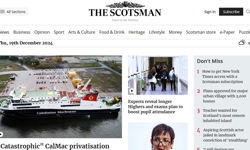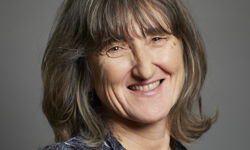
“It was gutting,” says Edward Iliffe, remembering the day when Trinity Mirror decided to prevent him regaining ownership of the daily Cambridge News.
Why did it happen? “You’d have to ask them [Trinity Mirror]. All I know is that was I given 24 hours’ notice that a deal I’d shaken on with Simon Fox [chief executive of Trinity Mirror] was not happening.
“I’d been working with a team of people for three months on how we were going to operate this split, but suddenly that was that. I’ve not spoken to him since his decision.”
That was in early 2016. More than a year later, things are looking up for Iliffe, who will one day become Baron Iliffe of Yattendon. His new Iliffe Media company launched the weekly Cambridge Independent in September last year; in January, it completed a £17m purchase of thirteen weekly newspapers in eastern England from Johnston Press; and, in April, it acquired KM Media Group, which produces nine paid-for and four free newspapers, including the Kent Messenger series.
As well as a poke in Trinity Mirror’s Cambridge eye, his new press kingdom continues an Iliffe obsession with local newspapers. The family entered publishing with the launch of The Midland Daily Telegraph (now the Coventry Telegraph) in 1891. During the next century, the family’s Yattendon Group owned a wide variety of titles, at one stage including the Birmingham Post and the Birmingham Mail, and partly owning the Daily Telegraph.
The Local World experiment
But by 2012, with the sector wobbling and keen to find a profitable future, the family decided to become founding members of Local World, a complex deal that saw its 39 titles – including the Cambridge News – merge with more than 50 from the giant Northcliffe regional empire.
This new ‘debt free’ consortium was co-owned by Northcliffe’s publisher, the Daily Mail and General Trust (38.7%), and Yattendon (21.3%), with Trinity Mirror buying a 20% stake and the rest owned by smaller investors. Yattendon’s 21.3% share was split between the family group and Edward Iliffe, who as chief executive of Yattendon personally owned 11% of Local World.
The new company was headed by high-profile media executive David Montgomery, who spent the next three years integrating and experimenting with its 16 daily newspapers, 36 paid-for weeklies, 40 free weeklies and 63 local websites.
But in 2015, Trinity Mirror launched a takeover of Local World with an irresistible £220m deal, and the Iliffe family agreed – as long as they could regain ownership of the Cambridge News and a small group of sister weekly papers.
“When Trinity Mirror made their original offer, we could have refused,” recalls Iliffe. “Anyone with a percentage of Local World had blocking rights. We did not want to be out of media and made that very clear.
“I shook hands with Simon Fox on the basis that the Cambridge News and the Hertfordshire titles would effectively transfer to us for a price. I negotiated a break fee, a perfectly normal thing for if communications broke down for whatever reason. But the clear arrangement was that Trinity Mirror would buy the business and then hive Cambridge back off to us.”
For a few months, Trinity Mirror played along, but on 29 February 2016, it suddenly announced it was keeping all the titles it had purchased from Local World, refusing to sell a few back to Yattendon as initially agreed. To this day, Iliffe remains mystified over why it reneged.
At the time, Trinity Mirror simply said: “The Board concluded that it was in the best interests of the company not to proceed … and therefore pay a break fee of £2m to Iliffe.” InPublishing asked Trinity Mirror spokesman Simon Haynes to expand, but he said: “It’s not something we will be commenting on.”
Birth of Iliffe Media
Given how it all went wrong, does Iliffe regret the Local World chapter? He gently corrects me: “I don’t think it’s gone ‘wrong’, it’s just not how I’d have planned it. We effectively capitalised our publishing assets into cash. That was never the intention, but we’ve now launched the Cambridge Independent and bought thirteen more papers.”
Is this new empire his ‘revenge’ on Trinity Mirror? “No. It’s not revenge,” he says. “We’ve arrived at a place we wouldn’t have designed or predicted. But it’s a place where we are still independent. I never planned not to publish in Cambridge. That’s never been in my thinking. We’ve been in Cambridge since 1922, and we’re not going to go away.”
Instead of rancour, Iliffe is generous about the “interesting experience” of the Local World years: “I can see what he [David Montgomery] wanted to do by pulling the content together across all the titles.
“All that data goes into a central space, and it should have been possible to have a model that measured and priced that content. The more content you have enables you to produce a more interesting title, and provide content to other publishers. And the scale means better publishing systems, IT and so on.
“That’s where it was moving towards. It never quite got there. We learnt a lot with Local World, such as ‘good news’. David Montgomery was monitoring what was read and consumed, which was easier in a large organisation. Local World had some really good ideas and it was disappointing that the experiment was brought to a conclusion too soon. That’s my main regret. It never got fully started.
“I’m not really sure what went wrong. The offer [from Trinity Mirror] was made and various people thought they should sell. And everyone made quite a bit of money. But that’s not really the point if you’re trying to construct something good. It seems a shame not to complete the project.”
Looking ahead, Iliffe feels he’s “probably in a better position than I could have imagined”. Yattendon still owns a press and offices which are free of debt. And he’s personally invested much of his 11% share of the Local World sale price into his new Iliffe Media company.
It took six months to design and develop the Cambridge Independent, a quality paper – both in terms of its stitched and trimmed tabloid format and its content, which is all locally generated.
“The idea was to create something that people wanted to read,” says Iliffe. “Good news not bad. Positive not negative. And only Cambridge. No PR stuff. We ring people up and find out what they’re about. No generic content.
“We’re going back to where we used to be. Serving the community. Cambridge has a feeling of community that works well. And feedback has been very positive.”
But what about revenues? At launch, the Independent had around fifteen editorial and commercial staff, and while its offices and press are owned by the Yattendon Group, the new Iliffe Media still has to pay its way. Is it washing its face?
“We’re here for the long term,” Iliffe assures me. “I don’t have a debt, and I don’t have a pension fund, so I can afford to keep this going for a long time. And now we’re part of a larger, profitable group.”
The titles Iliffe bought from Johnston Press are the Bourne Local, Bury Free Press, Diss Express, Fenland Citizen, Grantham Journal, Haverhill Echo, Lincolnshire Free Press, Lynn News, Newmarket Journal, Rutland Times, Spalding Guardian, Stamford Mercury and the Suffolk Free Press.
“We’re reviewing all the titles one by one,” Iliffe explains, “and there’s a plan afoot to see how we progress. But they have annual revenues totalling around £10m and are already profitable. The trick is to somehow stem the [sales] decline in a sensible time frame, finding out what the new level is for a long-term, sustainable business.
“We’re going to use the money they generate sensibly and in a planned way to develop content for local communities, recruiting new staff, retaining offices, and then the first big investment will be a new operating system.”
Then there are the thirteen weekly papers more recently bought from KM Media Group, as well as regional news site Kent Online, radio station kmfm and TV channel KMTV. This ‘white knight’ acquisition – which happened because of KM Media’s long-standing issues surrounding its closed final salary pension scheme – is so recent that it remains to be seen how quickly the Kent titles will be absorbed into Iliffe Media.
Investing in local journalism
But leaving the Kent titles aside, the Iliffe Media mini-empire until recently had a total of 88 staff, of which 49 were in editorial. Seventeen new staff have recently been recruited, of which eight are editorial. With most media groups cutting newsroom staff, a 16% increase in editorial is impressive.
“You need to invest in local journalism,” Iliffe says. “The demand for local, well-edited content is there. And we can’t produce content without people. The social media agenda is quite helpful, because people are starting to see the internet as just a huge gossip. People quite like reading other peoples’ opinions when they come from people who are respected and trusted.
“That’s what a newspaper does, in print or on screen – it doesn’t matter. People respect well-researched, well-produced content. The internet hasn’t changed anything, it’s just changed the means of delivery.”
All Iliffe Media titles will eventually be printed at Yattendon’s presses in Cambridge, helping to keep them rolling despite the departure of Local World contracts. “I felt I had a responsibility to keep the presses busy,” says Iliffe.
Another unusual policy for Iliffe Media is to keep as many of its newspapers’ local offices open as possible. “Wherever we can, we’ll maintain a presence in each town,” Iliffe says. “That’s important. We think shop fronts where they exist and new properties where we can. Somewhere the public can walk in off the street.”
A pause must have felt awkward, as Iliffe asks: “Does that sound archaic?” Not so much archaic, I tell him, but it’s a bit ‘back to the future’ to hear of a publisher talking this way.
“Ha! ‘Back to the future’. That’s a phrase I’ve used. I just don’t think the world’s changed massively. Yes, there are certain markets that have changed and we’re not going to get them back. But if it’s well-produced quality content, the means of delivery shouldn’t actually change what we are trying to deliver.
Paying readers wanted
“We will keep printing while readers keep buying the newspapers. And we’re keen on developing apps – our objective is to have subscribers. We want paying readers, that’s the objective, hopefully the outcome.”
At this point, Iliffe shows me the new app for the Cambridge Independent, already selling “hundreds” of subscriptions, although it’s still being refined and so has not yet been fully marketed.
“I think The Times has invested a lot on this type of thinking,” he says. “The Times’ app is really good. I don’t understand why the rest of the industry doesn’t follow it. We’re emulating it. If you produce something good, someone will pay for it.”
Iliffe, aged 48 and a father of three, is a chartered surveyor by profession. He’s still chief executive of the wider Yattendon Group, which today mainly focuses on property, farming and marinas. But his Iliffe Media venture is 100% owned and operated by him alone.
His father, Robert, the current Baron Iliffe, is still chairman of the Yattendon Group, but seems content to watch how his son’s new media empire progresses. “It’s easier to take decisions when it’s just you,” the younger Iliffe says. “If it goes wrong, it’s my problem, not Yattendon’s. As to whether it goes back into Yattendon or not in the future, we’ll wait to see what happens.”
For now, with his new papers, new staff and plans for new apps, Iliffe sounds like he’s having fun, and he agrees: “It’s exciting, enjoyable and interesting. And hopefully you get some galvanised people. It’s all about trust and being valued.
“To take stewardship of titles like the Stamford Mercury – Britain’s oldest continuously published newspaper [launched in 1712] is a privilege. We’re going to look after it, develop it and keep it going.”










